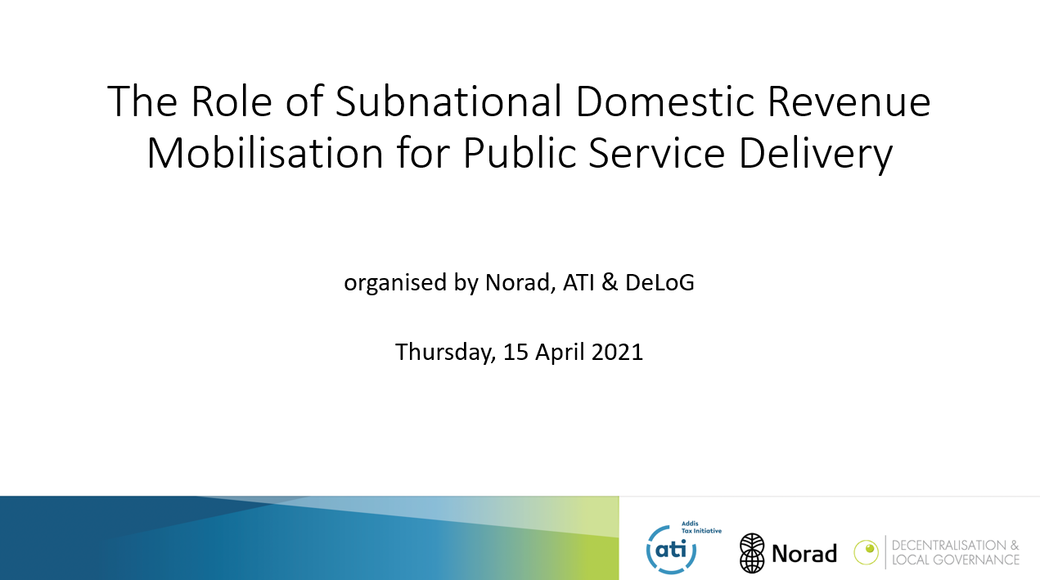Recording of Norad, ATI and DeLoG Webinar on ''The Role of Subnational Domestic Revenue Mobilisation for Public Service Delivery’’ now Available

© DeLoG/ Norad/ ATI
To view the recording of the webinar, click here.
Please note that by clicking on the link you will start playing the video on YouTube. In this context, please note DeLoG's and YouTube's respective privacy policies.
Background
Decentralisation of public services is widely seen as an effective way to strengthen trust between citizens and local governments (LGs). In fact, while LGs are best suited to deliver public services on their territories, they need stable public financing mechanisms, like intergovernmental fiscal transfers or own resource revenue.
To raise awareness on the roles of local governments’ in raising domestic revenue for public service delivery, the Addis Tax Initiative (ATI), the Development Partners Network on Decentralisation & Local Governance (DeLoG) and the Norwegian Agency for Development Cooperation (Norad) invited participants from all over the world to join in for a frank and open discussion. In this first webinar of the series, various aspects, benefits and challenges of domestic revenue mobilisation (DRM) reforms at subnational level were explored. The speakers highlighted important questions and case studies from various cities and regions. The valuable inputs by speakers and participants will be taken up in the second webinar.
Speakers
Odd-Helge Fjeldstad, Economist and Research Professor at the Christian Michelsen Institute,
Edward Abrokwah, Revenue Policy Division of the Ministry of Finance in Ghana
Rosetta Wilson, Financial Management Adviser, Mayors Delivery Unit for Revenue Mobilisation
Toril-Iren Pedersen, Policy Director of Tax for Development, Norwegian Agency for Development Cooperation (Norad)
Dmitry Pozhidaev, Global Advisor for Local Government and Head of Office Uganda for the UN Capital Development Fund (UNCDF).
Report
The webinar was kicked off with a keynote input by Odd-Helge Fjeldstad. He gave an overview on the research about local government taxation and DRM, and their impact on state-building. He highlighted the reasons why subnational taxation can play a fundamental role in citizen participation and trust for the government. He then moved on to analysing the necessary preconditions for functioning fiscal decentralisation and DRM. “Tax is not an end but is a means towards a well-functioning state”.
The next speaker was Edward Abrokwah, who took the case of Ghana to explore the opportunities and challenges deriving from national and local governments collaborating on subnational public revenues. He specifically discussed property taxes’ collection in Ghana, outlining issues like manual collection of data and the lack of technology to improve revenue mobilisation.
The word was then given to Rosetta Wilson, who talked about how Sierra Leone’s capital is using its urban transformation agenda, “Transform Freetown” to face numerous challenges like rapid population growth, informal settlements and high pressure on public services. The urban agenda is creating a resilient and sustainable city through increasing revenue using property taxes and rate digitisation. On an end note, she highlighted the lessons learnt from Freetown’s experience. The following discussion focused on how the Agenda is financed and how much of the budget comes from revenue.
Toril-Iren Pedersen discussed the opportunities and challenges of integrated and multi-level government responses to public revenue generation. She highlighted the stronger focus that the Addis Tax Initiative Declaration 2025 puts on subnational revenue regeneration, accountable stakeholders and the social contract. She gave Norad’s perspective on the untapped potential of local taxation for mobilising domestic revenue and the linkages between different levels of government. Among others, she emphasised looking for sources of revenue generation that have lower chances of being conflict drivers in fragile contexts. “Local governance and tax community are not engaging each other enough”.
The last speaker, Dmitry Pozhidaev, wrapped up the different perspectives given during the webinar. He discussed the challenges of collaboration between different levels of government, the importance of efficient tax administration systems, the composition of the fiscal revenue space and revenue mobilisation at local level.
“Local government revenue is not a zero-sum game. Without local governments being able to contribute to development, we will not be able to achieve the SDGs and the Agenda 2030”.
Ending on an opening note, the ATI and DeLoG highlighted some key messages of the event, which will be further elaborated in the second webinar on DRM and public service delivery. The large number of questions and feedback by the participants will serve as a basis for the concept of the second webinar.
For more information on the speakers and for the presentations, please click here.